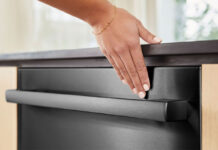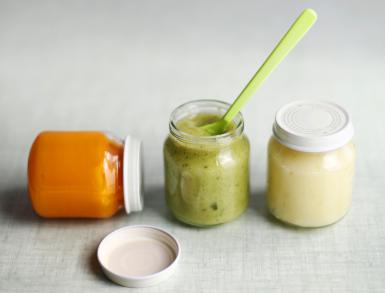
Back when I started feeding my first baby solids, I was a little intimidated by the entire process. My daughter had started with all of the cereals and was moving onto vegetables and fruit, and I had tried a jar of bananas and a jar of sweet potatoes when I realized that a., bananas don’t keep color like that without a little help, and b., I really just wanted my daughter to eat food that was as fresh as what we were eating.
What was stopping me? I didn’t know how easy it could be to whip up a bowl of fresh, preservative-free food for my baby, but armed with my blender and an ice cube tray, I set out to try. That’s the beauty of baby food: all you need is a little room in your kitchen, a small appliance or two, and you’re set to make massive batches of fresh food for your baby.
Once I started creating baby food I couldn’t stop, and my freezer was full of applesauce cubes, pea cubes, and even pureed beef stew. As my daughter got older I branched out even more by creating full recipes for her, and there are a lot of baby food recipes to try, trust me. From simple fruit combinations to vegetables your little one will love to eat, there’s something new for every day of the week.
Before you get started making baby food though, there are a few things to keep in mind.
Be up on your baby’s allergies and what causes gas
There’s a reason why doctors recommend you follow the cereal, vegetable, fruit steps when it comes to introducing solids. By introducing one food at a time you can weed out what causes gas or an allergic reaction. Some of the common allergies are eggs, milk, wheat, soy, and tree nuts, so you should wait until your baby is older to introduce these. You should also wait until your baby is at least 10 months old or you’ve got the OK from your doctor to introduce gassy foods like cauliflower or broccoli.
Go organic
Organic fruit, vegetables, and meats are best for baby. Without all of the toxins and chemicals, you know your child is getting the best food for the best start in life.
Set up your kitchen
Making baby food is easy when you’re set up with everything you need to create and store your food. A great blender is handy to have around to puree fruits and vegetables when baby is young, and you can use it to mash up your own meals when baby is old enough to eat with you.
Another great option is a baby food maker like the Babycook Classic. It defrosts, steams, blends, and warms all types of foods so you can quickly serve them to your baby.
If you’re in the mood to make a few batches of baby food this weekend, try these recipes. They’re for older babies and come from tried and true mom blogs across the country.
Baby’s Little Pasta Soup
This is for an older baby without allergies. I made this for my daughter when she was little and she loved the tiny noodles and chicken broth. Photo and recipe from Parenting.com.
| Ingredients: 11/2 cups (355 ml) low-sodium chicken broth 2 (22 g) tablespoons uncooked pastina |
Directions
Bring broth to a gentle boil and add pastina. Cook, stirring frequently, 7 or 8 minutes, or until pastina is cooked. Serve warm.
This recipe, covered tightly, will last for 2 to 3 days in the refrigerator. To reheat, just add a bit of water.
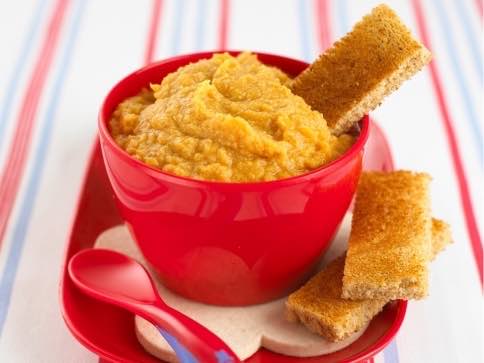
Chicken with carrots and apple puree
Apple sauce is a magic baby food. Just add a little to something your baby doesn’t really care for and all of a sudden it’s their favourite food. That’s why this recipe is so great. It’s also for an older baby, but the addition of apple makes those carrots really easy to gobble down. Photo and recipe from Annabelkarmen.com.
| Ingredients: 1/2 tbsp olive oil 1/2 small onion, peeled and chopped 350g/12oz carrots, peeled and sliced 250ml/8 fl oz unsalted chicken stock or use water with a bay leaf 1 chicken breast (approx. 125g/4oz) 1 small apple, cored, peeled and chopped |
Directions
Heat the olive oil in a saucepan and sauté the onion until softened.
Add the sliced carrots, pour over the chicken stock or water and bay leaf and bring to the boil.
Reduce the heat, then cover and cook for 10 minutes.
Cut the chicken into pieces and add to the carrots together with the chopped apple, and continue to cook for 10 minutes.
Remove the bay leaf if necessary.
Puree in a blender and then spoon some of the puree into your baby’s bowl and serve lukewarm.
Freeze the remainder in individual portions.
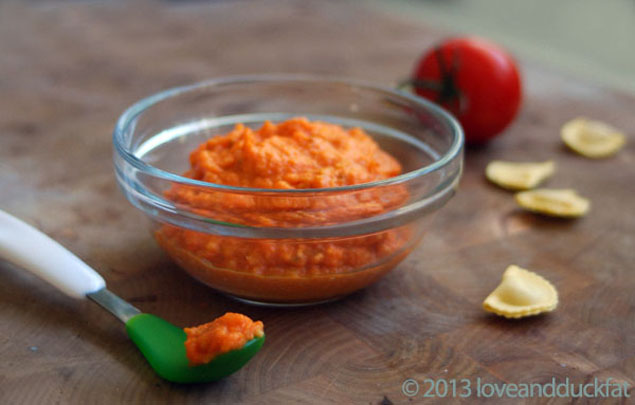
Baby Vegetable lasagne
Older babies love variety in their diet, and if you want to try your first baby lasagne, this is a great go-to recipe. Photo and recipe from loveandduckfat.com.
| Ingredients: ½ organic onion, diced 1 tablespoon extra-virgin olive oil 1 small garlic clove or a pinch of garlic powder Pinch dried oregano 2 carrots, chopped 1 cup zucchini (and/or eggplant, spinach, peas, etc.), chopped 2 tablespoons organic tomato paste 1 cup vegetable or chicken stock ½ cup pasta (your choice) 2 tablespoons ricotta cheese 1 teaspoon Parmesan cheese, grated |
Directions
In a saucepan over medium heat, cook onion in olive oil until soft. Add garlic and oregano, stir. Add carrots, veggies, tomato paste and stock. Stir and bring to a boil. Add pasta. Cover and cook for 10-15 minutes until carrots are tender. You can overcook the pasta in this case, since it will be pureed. Once all of the veggies are tender, remove from heat and stir in the ricotta and Parmesan cheese. Allow to cool and puree until smooth, adding the cooking liquid a little at a time until you reach the right consistency.
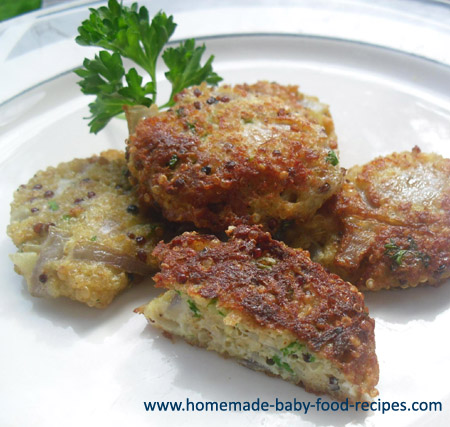
Baby Quinoa Bites
Quinoa is an amazing grain, but it’s not the best when served on its own. Try this recipe for quinoa bites and see what your baby thinks. Photo and recipe from blog.homemade-baby-food.com.
| Ingredients: 1 cup cooked quinoa 2 small eggs, beaten 2 tbsp chopped fresh parsley pinch freshly ground black pepper 1/2 onion, finely chopped 2 tbsp grated Parmesan cheese 1 clove of garlic, crushed 1/2 cup fresh whole wheat bread crumbs olive oil |
Directions
Combine all the ingredients in a large bowl and allow to rest for 5 minutes, to give the bread crumbs a chance to soak up the liquid.
The mixture will still be very damp and loose. Form into 16 loose patties.
Heat a little olive oil in a non stick pan over a medium heat.
Add the patties to the pan – we found it easiest to hold the plate of patties over the pan and slide them in one by one with a spatula. Press down on them carefully.
Cook for around 5 minutes until golden, then carefully turn and repeat on the other side.
When cooked, allow to cool to a safe serving temperature and serve just as they are, or with an apple sauce dip.
Making baby food is easy, and once you start branching out into recipes like these, you’ll be inspired to create some of your own for your baby. Have fun making baby food this weekend, and here’s a look at some of the kitchen tools I’ve used when making baby food.
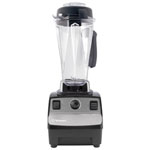 You can make baby food in a blender |
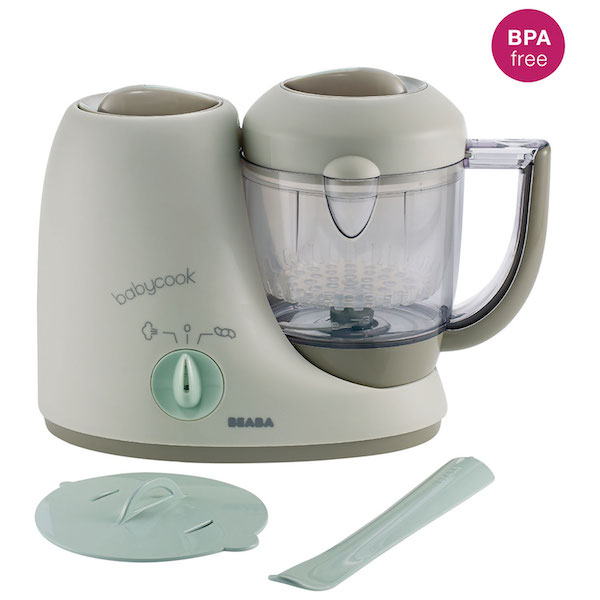 or a baby food maker |
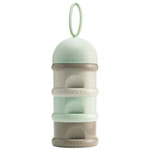 You can store your baby food in easy-to-use containers so there’s always baby food on hand |

